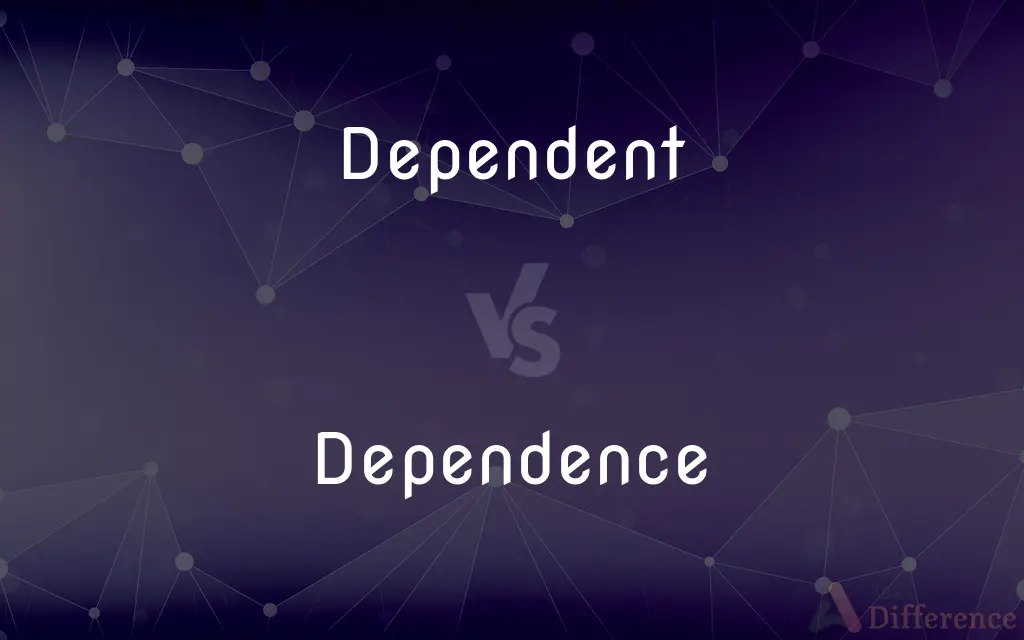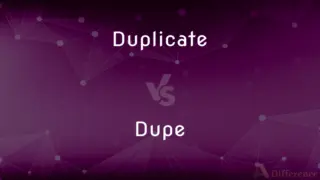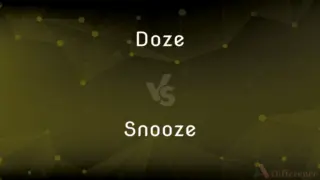Dependent vs. Dependence — What's the Difference?

Difference Between Dependent and Dependence
ADVERTISEMENT
Compare with Definitions
Dependent
Contingent on or determined by
The various benefits will be dependent on length of service
Dependence
The state of being determined, influenced, or controlled by something else
The economy's dependence on oil.
Dependent
Requiring someone or something for financial or other support
An economy heavily dependent on oil exports
Households with dependent children
Dependence
The state of being dependent on another for financial support.
Dependent
(of a clause, phrase, or word) subordinate to another clause, phrase, or word
A clause dependent on another clause
ADVERTISEMENT
Dependence
The condition of being dependent on a substance such as a drug or on a given behavior
Alcohol dependence.
Gambling dependence.
Dependent
Variant spelling of dependant
Dependence
(Archaic) Trust; reliance.
Dependent
Determined, influenced, or controlled by something else.
Dependence
The state of being dependent, of relying upon another.
He had a deep dependence on her for guidance.
Dependent
(Grammar) Subordinate to another clause, phrase, or word.
Dependence
An irresistible physical or psychological need, especially for a chemical substance.
Her dependence on cocaine led to her ruin.
Dependent
Relying on or requiring the aid or support of another
Adult children who are still dependent on their parents.
Dependence
The act or state of depending; state of being dependent; a hanging down or from; suspension from a support.
Dependent
Needing to continue use of a drug or other substance or engagement in a specific activity in order to avoid experiencing withdrawal symptoms
Dependent on alcohol.
Dependence
The state of being influenced and determined by something; subjection (as of an effect to its cause).
The cause of effects, and the dependence of one thing upon another.
Dependent
(Archaic) Hanging down.
Dependence
Mutual connection and support; concatenation; systematic inter-relation.
So dark and so intricate of purpose, without any dependence or order.
Dependent
Also de·pen·dant One who relies on another, especially for financial support.
Dependence
Subjection to the direction or disposal of another; inability to help or provide for one's self; a lack of independence or self-sufficiency.
Reduced to a servile dependence on their mercy.
Dependent
Relying upon; depending upon.
At that point I was dependent on financial aid for my tuition.
Dependence
A resting with confidence; reliance; trust.
Affectionate dependence on the Creator is the spiritual life of the soul.
Dependent
(statistics) Having a probability that is affected by the outcome of a separate event.
Dependence
That on which one depends or relies; as, he was her sole dependence.
Dependent
Used after a particle (with one or two exceptions), such as those which express questions, subordinate clauses, and negative sentences.
Dependence
That which depends; anything dependent or suspended; anything attached a subordinate to, or contingent on, something else.
Like a large cluster of black grapes they showAnd make a large dependence from the bough.
Dependent
(medicine) Affecting the lower part of the body, such as the legs while standing up, or the back while supine.
Dependence
A matter depending, or in suspense, and still to be determined; ground of controversy or quarrel.
To go on now with my first dependence.
Dependent
Hanging down.
A dependent bough or leaf
Dependence
Lack of independence or self-sufficiency
Dependent
(US) One who relies on another for support
With two children and an ailing mother, she had three dependents in all.
Dependence
Being abnormally tolerant to and dependent on something that is psychologically or physically habit-forming (especially alcohol or narcotic drugs)
Dependent
(grammar) An element in phrase or clause structure that is not the head. Includes complements, modifiers and determiners.
Dependent
(grammar) The aorist subjunctive or subjunctive perfective: a form of a verb not used independently but preceded by a particle to form the negative or a tense form. Found in Greek and in the Gaelic languages.
Dependent
Hanging down; as, a dependent bough or leaf.
Dependent
Relying on, or subject to, something else for support; not able to exist, or sustain itself, or to perform anything, without the will, power, or aid of something else; not self-sustaining; subordinate; - often with on or upon; as, dependent on God; dependent upon friends. Opposite of independent.
England, long dependent and degraded, was again a power of the first rank.
Dependent
Conditional; contingent or conditioned. Opposite of unconditional.
Dependent
Addicted to drugs.
Dependent
One who depends; one who is sustained by another, or who relies on another for financial support or favor; a hanger-on; a retainer; as, a numerous train of dependents.
A host of dependents on the court, suborned to play their part as witnesses.
Dependent
That which depends; corollary; consequence.
With all its circumstances and dependents.
Dependent
A person who relies on another person for support (especially financial support)
Dependent
Not independent;
Dependent children
Dependent
Contingent on something else
Dependent
Of a clause; unable to stand alone syntactically as a complete sentence;
A subordinate (or dependent) clause functions as a noun or adjective or adverb within a sentence
The main (or independent) clause in a complex sentence has at least a subject and a verb
Dependent
Being under the power or sovereignty of another or others;
Subject peoples
A dependent prince
Dependent
Addicted to a drug
Share Your Discovery

Previous Comparison
Duplicate vs. Dupe
Next Comparison
Doze vs. Snooze













































